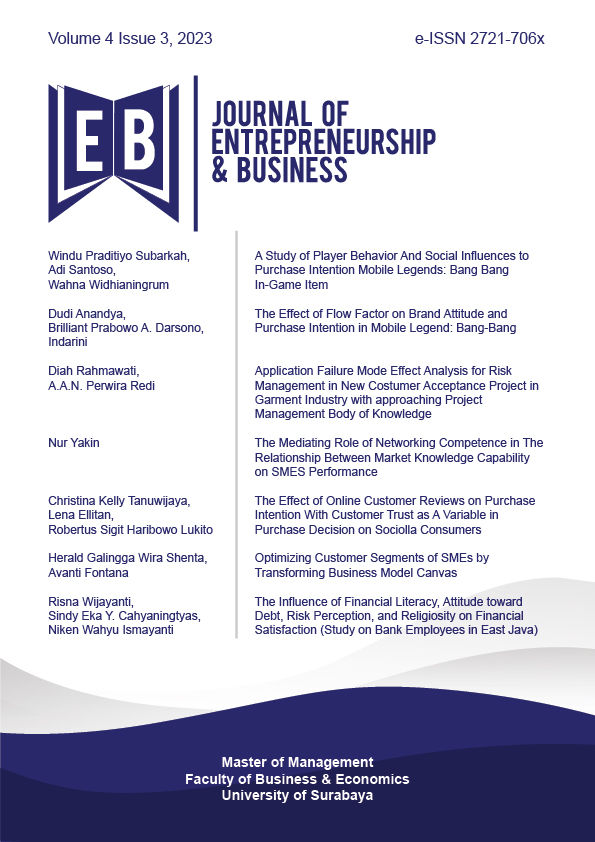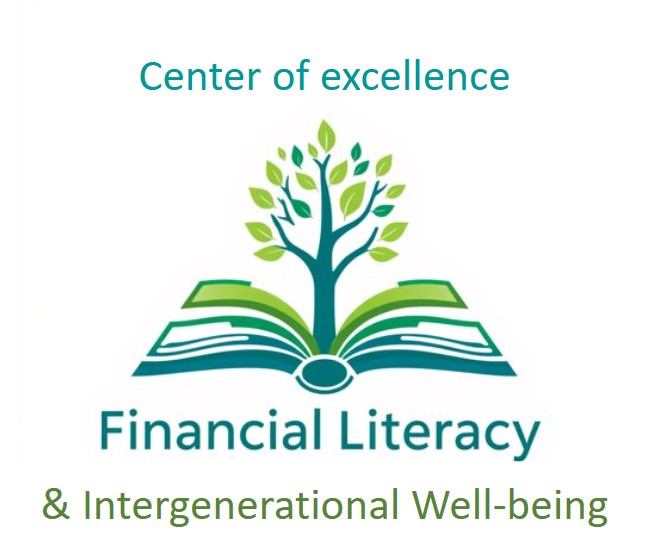The Influence of Financial Literacy, Attitude toward Debt, Risk Perception, and Religiosity on Financial Satisfaction (Study on Bank Employees in East Java)
 Abstract Views:
520 times
Abstract Views:
520 times
 PDF Downloads:
433 times
PDF Downloads:
433 times
Abstract
Purpose: to contribute to further research on the conceptualization of financial satisfaction as a specific individual satisfaction domain based on subjective behavioral studies using a judgment approach. Financial Satisfaction is mostly studied based on standard economic theory which uses an objective approach in determining individual satisfaction with their financial conditions such as income, socio-demography, socio-capital, and socio-economy. This research examines several subjective variables in the form of judgment and examines the integrated relationship between these variables such as financial literacy, risk perception, attitudes toward debt, and religiosity.
Method: The sample for this research was 100 bank employees in East Java using a random sampling method. The analysis technique used is SEM PLS.
Result: The results show that financial literacy influences financial satisfaction among bank employees in East Java. Likewise, attitudes toward debt and religiosity also show an influence on financial satisfaction. Meanwhile, risk perception has no effect on financial satisfaction among bank employees in East Java.
Downloads
References
Ahmed, Z., Rasool, S., Saleem, Q., Khan, M. A., & Kanwal, S. (2022). Mediating Role of Risk Perception Between Behavioral Biases and Investor’s Investment Decisions. SAGE Open, 12(2), 215824402210973. https://doi.org/10.1177/21582440221097394
Annur, C. M. (2022). 10 Provinsi dengan Nasabah Bank Terbanyak, Jakarta Juara. https://databoks.katadata.co.id/datapublish/2022/12/27/10-provinsi-dengan-nasabah-bank-terbanyak-jakarta-juara#:~:text=Berdasarkan data Lembaga Penjamin Simpanan,on-year%2Fyoy).
Asfira, N., Rokhmawati, A., & Fathoni, A. F. (2019). Pengaruh Financial Literacy dan Investment Experience terhadap Risk Tolerance dan Investment Decision. Jurnal Ekonomi, 27(4), 340–352. http://je.ejournal.unri.ac.id/
Badriatin, T., Rinandiyana, L. R., & Marino, W. S. (2022). Persepsi Risiko Dan Sikap Toleransi Risiko Terhadap Keputusan Investasi Mahasiswa. Jurnal Perspektif, 20(2), 158–163. https://doi.org/10.31294/jp.v20i2.13596
Arianti, B.F., & Azzahra, K. (2020). Faktor - Faktor Yang Mempengaruhi Literasi Keuangan : Studi Kasus UMKM Kota Tangerang Selatan. Jurnal Manajemen Dan Keuangan, 9(2), 156–171. https://doi.org/10.33059/jmk.v9i2.2635
Balasubramnian, B., & Sargent, C. S. (2020). Impact of inflated perceptions of financial literacy on financial decision making. Journal of Economic Psychology, 80(January), 102306. https://doi.org/10.1016/j.joep.2020.102306
Beatrice, V., Murhadi, W. R., & Herlambang, A. (2021). The effect of demographic factors on behavioral biases. Jurnal Siasat Bisnis, 25(1), 17–29. https://doi.org/10.20885/jsb.vol25.iss1.art2
Brooks, C., & Williams, L. (2021). The impact of personality traits on attitude to financial risk. Research in International Business and Finance, 58(July), 101501. https://doi.org/10.1016/j.ribaf.2021.101501
Carvalho, J.P., & Sacks, M., (2021). The Economics of religious Communities. Journal of Public Economics, 201(Sept), 104481. https://doi.org/10.1016/j.jpubeco.2021.104481
Chu, Z., Wang, Z., Xiao, J. J., & Zhang, W. (2017). Financial Literacy, Portfolio Choice and Financial Well-Being. Social Indicators Research, 132(2), 799–820. https://doi.org/10.1007/s11205-016-1309-2
Darwati, J. T., Zulkifli, & Rachbini, W. (2022). Pengaruh Literasi Keuangan, Self Control dan Risk Tolerance Terhadap Keputusan Investasi Melalui Perilaku Keuangan. Jurnal Pemasaran, Keuangan & Sumber Daya Manusia, 2(1), 8–22. www.idxchannel.com
Frey, B. S., & Stutzer, A. (2002). What can economists learn from happiness research? Journal of Economic literature, 40(2), 402-435. https://www.aeaweb.org/articles?id=10.1257/002205102320161320
Goenadi, G. F., Murhadi, W. R., & Ernawati, E. (2022). The Influence of Financial Literacy on Financial Inclusion: Social Capital as Mediating Variable. Media Ekonomi Dan Manajemen, 37(2), 195. https://doi.org/10.24856/mem.v37i2.2738
Kose, T., & Cinar, K. (2020). A Global Assessment of the Relationship between Religiosity and Financial Satisfaction. The Social Science Journal, 1-21. http://dx.doi.org/10.1080/03623319.2020.1808769
Kristanto HC, H. (2022). Adoption of Islamic Banking in Financial Satisfaction : Study on Bank Syariah Indonesia Yogyakarta Region. Jurnal Riset Akuntansi Dan Bisnis Airlangga, 7(2), 1300–1318. https://doi.org/10.20473/jraba.v7i2.37205
Marshall, E.A., & Shepherd, H. (2018). Fertility preferences and cognition: Religiosity and experimental effects of decision context on college women. Journal of Marriage and Family, 80(2), 521–536. 10.1111/jomf.12449
Muat, S., & Henry, K. (2023). Lecturers’ financial wellness: The role of religiosity, financial literacy, behavior, and stress with gender as the moderating variable. Journal of Accounting and Investment, 24(2), 427–449. https://doi.org/10.18196/jai.v24i2.17428
Murhadi, W. R., Kencanasar, F. R., & Sutedjo, B. S. (2023). the Influence of Financial Literacy and Financial Interest on the Financial Risk Tolerance of Investor in Indonesia. Journal of Law and Sustainable Development, 11(2), 1–16. https://doi.org/10.55908/sdgs.v11i2.310
Ngamaba, K. H., & Soni, D. (2018). Are happiness and life satisfaction different across religious groups? Exploring determinants of happiness and life satisfaction. Journal of Religion and Health, 57(6), 2118–2139. https://doi.org/10.1007/s10943-017-0481-2
Normawati, R. A., Rahayu, S. M., & Worukinasih, S. (2022). Financial Satisfaction on Millennials: Examining the Relationship Between Financial Knowledge, Digital Financial Knowledge, Financial Attitude, and Financial Behavior. Jurnal Aplikasi Manajemen, 20(2). https://doi.org/10.21776/ub.jam.2022.020.02.12
Nuryasman MN, N. S. (2020). Faktor-Faktor Yang Mempengaruhi Pengambilan Keputusan Investasi Saham. Jurnal Ekonomi, 25(2), 251. https://doi.org/10.24912/je.v25i2.669
Owusu, G. M. Y. (2023). Predictors of financial satisfaction and its impact on psychological wellbeing of individuals. Journal of Humanities and Applied Social Sciences, 5(1), 59–76. https://doi.org/10.1108/jhass-05-2021-0101
Putri, R. A., & Isbanah, Y. (2020). Faktor-Faktor yang Mempengaruhi Keputusan Investasi pada Investor Saham di Surabaya. Jurnal Ilmu Manajemen, 8(1), 197– 209.
Sawitri, N. N. (2018). Behavior in managing revenue to achieve financial satisfaction. Opcion, 34(86), 1274–1291.
Tharp, D. T., Seay, M. C., Carswell, A. T., & MacDonald, M. (2020). Big Five personality traits, dispositional affect, and financial satisfaction among older adults. Personality and Individual Differences, 166(February), 110211. https://doi.org/10.1016/j.paid.2020.110211
Vang, Z. M., Hou, F., & Elder, K. (2019). Perceived Religious Discrimination, Religiosity, and Life Satisfaction. Journal of Happiness Studies volume, 20(6), 1913-1932. https://doi.org/10.1007/s10902-018-0032-x
Wendy, W. (2021). Efek Interaksi Literasi Keuangan Dalam Keputusan Investasi: Pengujian Bias-Bias Psikologi. Jurnal Ekonomi Bisnis Dan Kewirausahaan, 10(1), 36. https://doi.org/10.26418/jebik.v10i1.43403
Xiao, J.J., Chen, C. & Chen, F. (2014). Consumer Financial Capability and Financial Satisfaction. Soc Indic Res, 118, 415–432. https://doi.org/10.1007/s11205-013-0414-8
Xiao, J.J.. & O'Neill, B. (2016). Consumer Financial Education and Financial Capability. International Journal of Consumer Studies, 40(6), 712-721. https://doi.org/10.1111/ijcs.12285

This work is licensed under a Creative Commons Attribution 4.0 International License.
Articles published in Journal of Entrepreneurship & Business are licensed under a Creative Commons Attribution 4.0 International (CC BY) license. You are free to copy, transform, or redistribute articles for any lawful purpose in any medium, provided you give appropriate credit to the original author(s) and the journal, link to the license, and indicate if changes were made.
Authors submitting to this journal agree to make their work freely available under the CC BY 4.0 license, ensuring broad dissemination and reuse. The full license details can be accessed at https://creativecommons.org/licenses/by/4.0/.
This ensures that they receive the maximum dissemination because there are no barriers to access. This license allows readers to disseminate and reuse the paper, but always requires them to grant the authors and the first publication full credit.
While JEB upholds ethical publishing standards, the responsibility for ensuring originality and compliance with copyright regulations lies with the authors. The journal is not liable for any legal claims related to the content of published articles.
For further inquiries, please contact the editorial team.

 DOI:
DOI:











